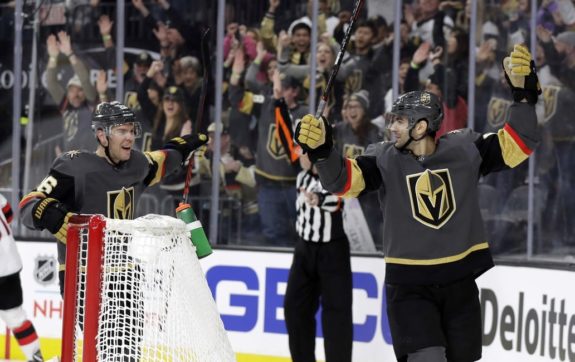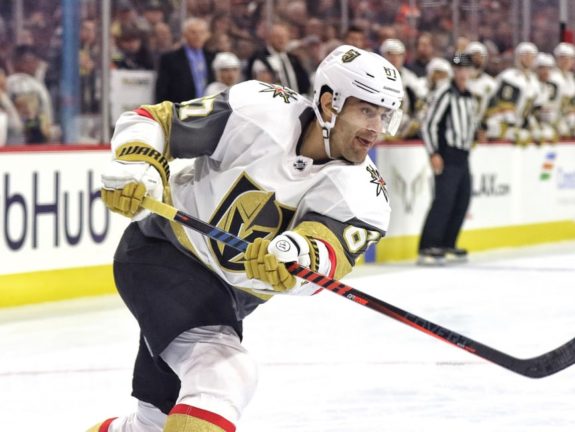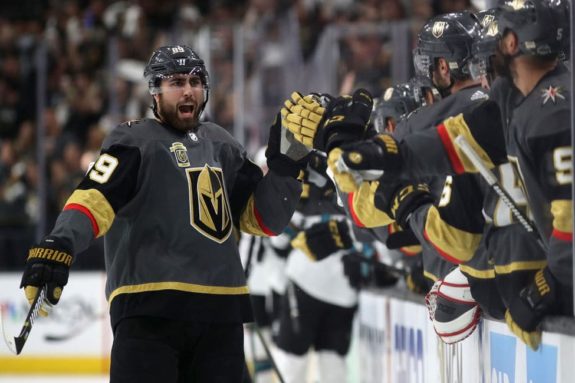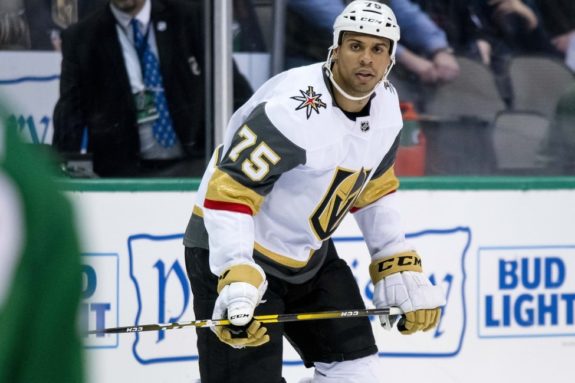Well, the ice has finally settled on the 2018-19 season with the St. Louis Blues claiming their first-ever Stanley Cup. After 52 long years and only sporadic postseason appearances, the Blues finally have that first notch on their belt.
With two consecutive playoff appearances in two years as a franchise, Vegas Golden Knights fans are hopeful that they won’t have to wait half a century for a Stanley Cup victory. Before attention completely shifts to the upcoming 2019-20 season, let’s take a moment to reflect on the past season and see how each of the Golden Knights’ position groups performed. Starting up front, we’ll work our way back to defense and goaltenders.
Golden Knights’ Sword (Offense)
The Golden Knights’ offensive weapons may not have been the most explosive during the 2018-19 season, but they got the job done. Out of 31 teams, Vegas tied for 13th in goals scored over the course of the regular season with the Montreal Canadiens. The Golden Knights managed to find the back of the net 246 times, making for just about three goals per game on average.

Despite an average number of total goals, Vegas ranked second in total shot attempts – peppering opposing netminders 2,814 times. That works out to be a goal every 11-12 shots on net. And considering that NHL teams typically strive for 30-plus shots per game, plus Vegas’ three goals per game average, the math checks out. Seeing how the Golden Knights stacked up collectively against the rest of the NHL, let’s see how specific players contributed to (or detract from) the combined success of the forwards.
The Top Line
The Golden Knights’ top line centered by William Karlsson with Jonathan Marchessault and Reilly Smith on the wings led the way, with all three surpassing the 50-point mark – 56, 59, and 53, respectively. Together, the trio combined for almost 28 percent of Vegas’ 246 goals during the regular season.
The top line for Vegas certainly shouldered their share of the weight during the regular season. However, all three of their point totals dropped from the 2017-18 season while playing in just as many games (Karlsson) or more (Marchessault and Smith) during the 2018-19 season. Marchessault and Smith are both locked into contracts for at least a couple more years each, but Karlsson is a restricted free agent this summer.

Surprisingly, and unfortunately, the top line lost its edge during a short-lived playoff run – accounting for 17 points in seven games. The Golden Knights’ second line accounted for 31 points in the same time frame. While it’s desirable for a team to get solid production from each line, having the top line fizzle out during the postseason is not a recipe for success.
Karlsson’s free agency presents a dilemma for the Golden Knights’ front office this offseason. They would be hard-pressed to part ways with a player who has arguably become a face of the franchise, and who still played a major role in the Golden Knights’ offensive success despite not matching his 2017-18 stats. On the other hand, Vegas is bumping up against their cap ceiling and they don’t want to throw too much money at Karlsson if his numbers are going to continue to drop.
Middle of the Pack
While a productive first line is expected and necessary, it’s hard to be successful without a supporting cast of other forwards who can put the puck in the net, as well as keep opponents at bay. Luckily for the Golden Knights, they had quite a handful of forwards step up and carry the load.
Forwards such as Alex Tuch, Paul Stastny, Cody Eakin, and Max Pacioretty all played roles in Vegas’ offensive success. Each put up over 40 points, with all except Stastny scoring at least 20 goals in the process.

Max Pacioretty (Amy Irvin / The Hockey Writers) 
Paul Stastny (Ron Chenoy-USA TODAY Sports) 
Alex Tuch (Photo by Christian Petersen/Getty Images)
Tuch in particular provided some secondary firepower for the Golden Knights. After putting up 37 points in 78 games during the 2017-18 season, Tuch followed up with a 52-point performance in 74 games this season. Vegas smartly signed Tuch to a seven-year contract early on this season, demonstrating the faith they have in him moving forward. There’s no reason the Golden Knights shouldn’t continue to expect solid performances from the young 23-year-old forward.
Some forwards contributed more prominently on the defensive side of things, most notably Mark Stone. In addition to leading the Golden Knights with 12 points in the 2019 Playoffs, Stone was named as a finalist for the Selke Trophy, presented annually to the league’s best defensive forward.
Weak Links
Aside from a top line that submitted a sub-par playoff performance, the Golden Knights had very few chinks in the armor, especially at forward. Vegas will need Tomas Nosek and Ryan Carpenter to step up, hopefully contributing at least 20 points moving forward and fixing minus-10 and minus-six plus/minus ratings.
Another weak point may rest in Ryan Reaves. It’s no shock that Reaves is not a top points producer, but shelling out over $2 million for an “enforcer” doesn’t seem to mesh with the Golden Knights’ philosophy or fit the mold of the other forwards. Vegas has garnered a reputation over the past two seasons as a high-scoring, highlight reel team. Carrying a player like Reaves seems like dead weight.

If the Golden Knights are looking to add some grit to their lineup, there are plenty of players who can provide a hard-nosed style of play while also contributing consistently in the goals and assists columns. One such player that comes to mind is Cal Clutterbuck of the New York Islanders. Clutterbuck, who sits in second place for most hits since the 2005-06 season with 3,015, regularly averages around 20 points over the course of the season.
The Golden Knights also suffered offensively from Erik Haula’s absence due to injury. The Finnish native was a driving force for Vegas in 2017-18, amassing 55 points in 76 games. In the 2018-19 season, he was limited to a mere seven points in just 15 games played. Who knows if Haula’s presence could have sparked the Golden Knights’ offense in the postseason.
Final Grade
Vegas’ forwards get a B+ for the 2018-19 season. The Golden Knights were efficient and consistent in the regular season, earning them high marks. However, the untimely drought among the top line ultimately brought the forwards’ final grade down.
Regardless of what happens with Karlsson, Vegas has a solid body of productive forwards who will continue to keep the Golden Knights in contention at the top of the Western Conference.